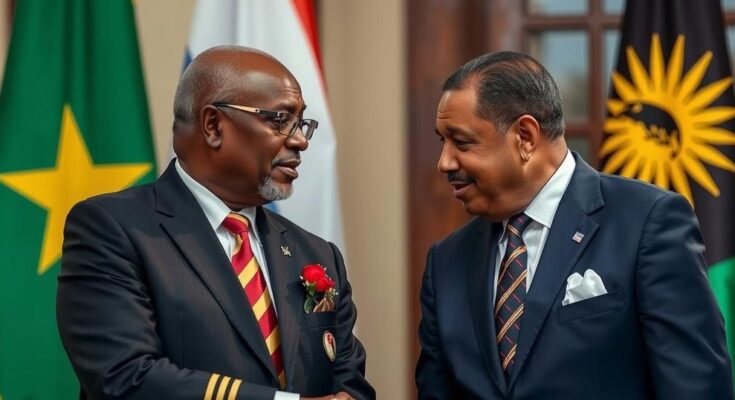Zimbabwean President Emmerson Mnangagwa met with Botswana’s new President Duma Boko to discuss the need for stronger diplomatic relations following significant political changes in Botswana. The conversation focused on improving trade, security, and economic partnerships as both leaders strive to manage their ideological differences while cooperating for regional stability.
Zimbabwean President Emmerson Mnangagwa recently engaged with Botswana’s new President Duma Boko during World Children’s Day celebrations in Victoria Falls. This meeting signals Mnangagwa’s intention to mend diplomatic ties following the electoral defeat of his ally, former President Mokgweetsi Masisi, whose loss to Boko’s Umbrella for Democratic Change (UDC) has significantly altered Botswana’s political landscape. The UDC’s victory represents a considerable disruption to the longstanding dominance of the Botswana Democratic Party (BDP), which had governed for nearly sixty years. Mnangagwa’s delay in congratulating President Boko illustrated the strain that this shift imposed on bilateral relations. As described by an insider, the meeting aimed to rebuild trust, with Mnangagwa emphasizing the necessity of early engagement to foster cooperation between the two countries. Key issues discussed included trade facilitation, border management, security collaboration, and economic partnerships, demonstrating a mutual desire to advance these shared interests. Despite political differences—Mnangagwa’s representation of the established liberation party and Boko’s affiliation with the reformist opposition—the two leaders sought a pragmatic approach to collaboration. Moreover, Boko’s ascension enhances the challenges faced by traditional liberation movements in Southern Africa. With diverse opposition parties gaining ground in countries like Zimbabwe and South Africa, Mnangagwa’s urgency to adapt is evident. This situation was highlighted during the inauguration of Boko, wherein both Mnangagwa and Masisi faced criticism from the public, while opposition figures received commendations. Mnangagwa appears to have taken lessons from previous diplomatic lapses, particularly with Zambian President Hakainde Hichilema. The slow response to Zambia’s leadership transition presented challenges that necessitated considerable efforts to rectify. In contrast, Mnangagwa has recognized the importance of responding swiftly to Botswana’s new political reality to prevent similar pitfalls.
The political dynamics in Southern Africa are evolving, with a significant rise of opposition parties challenging the historical dominance of liberation movements such as Zimbabwe’s ZANU-PF and South Africa’s ANC. The recent electoral success of Duma Boko in Botswana reflects broader regional shifts and impacts bilateral relations, particularly for those leaders aligned with the outgoing administrations. President Mnangagwa’s engagement with Botswana’s new leadership is a strategic move to maintain regional ties amid these changes, ensuring Zimbabwe’s interests are safeguarded as political landscapes transform.
In summary, the recent meeting between Presidents Mnangagwa and Boko represents a strategic effort to foster cooperation in response to shifting political dynamics in Southern Africa. By addressing shared interests and learning from past diplomatic experiences, both leaders aspire to navigate their ideological differences for the sake of regional stability and economic growth. This dialogue highlights the necessity for pragmatic collaboration in an evolving landscape marked by increasing opposition activity.
Original Source: www.thezimbabwemail.com




